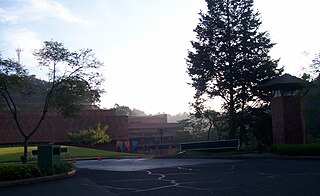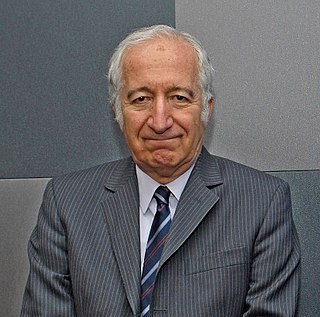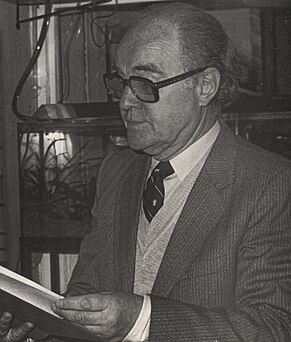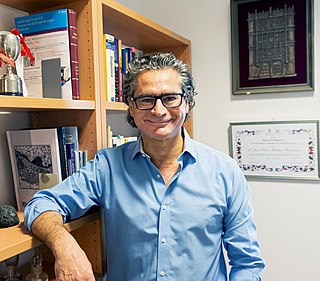
Francisco Marroquín University, also known by the abbreviation UFM, is a private, secular university in Guatemala City, Guatemala. It describes its mission as "to teach and disseminate the ethical, legal, and overall economic principles of a society of free and responsible persons."

Sir Salvador Enrique Moncada Seidner, FRS, FRCP, FMedSci is a Honduran pharmacologist and professor. He is currently Research Domain Director for Cancer at the University of Manchester.
Pablo Rudomin Zevnovaty is a Mexican-Russian biologist, physiologist, and neuroscientist. He is regarded as one of the most prestigious neurophysiologists in the international community. His studies have been fundamentally directed to the analysis of mechanisms of the central control of the information transmitted by the sensory fibers in the spinal cord, and of how these are modified during central and peripheral injuries, as well as during processes of acute inflammation.

The National University of Tucumán is an Argentine national university located in Tucumán Province and the largest in Argentina's northwest region. Founded on 25 May 1914 in San Miguel de Tucumán, access to the university is unrestricted and free of charge.
Arturo Andrés Roig was an Argentine philosopher.

Elio García-Austt (1919–2005) was a Uruguayan neuroscientist.

Ricardo Luis Lorenzetti is an Argentine judge graduated from the National University of the Littoral, Argentina, with a long national and international career. He used to be Chief Justice of the Supreme Court of Argentina (2007–2018), proposed by President Néstor Kirchner and approved by the Senate, assuming his position on December 12, 2004, covering the vacancy caused by the resignation of Justice Adolfo Vázquez. On November 7, 2006, he was appointed Chief Justice, officiated as of January 1, 2007. Currently, he is one of the five Justices of the Supreme Court. He was President of the Commission for the preparation of the Parliamentary Act to reform, update and unify the Civil and Commercial Codes of the Argentine Nation, Presidential Decree 191/2011.

Julio Ángel Fernández Alves is a Uruguayan astronomer and teacher, member of the department of astronomy at the Universidad de la República in Montevideo. He is also a member of PEDECIBA,, and the Uruguayan Society of Astronomy. From 2005 to 2010, he was the Dean of the Universidad de la Republica's Faculty of Sciences. The asteroid 5996 Julioangel, discovered in 1983, was named after him.

Bernardo Kliksberg is an Argentine Doctor of Economics, recognized around the world as the founder of a new discipline, social management, and a pioneer of development ethics, social capital and corporate social responsibility. His books, papers, advisory work, and research, applies an interdisciplinary approach integrating contributions of different social sciences.

Miguel Angel Fernández Sanjuán is a Spanish Theoretical Physicist from Leon, Spain. He is known for his contributions in nonlinear dynamics, chaos theory, and control of chaos, and has published several scientific papers and popular news articles. He has supervised around 20 PhD students in Nonlinear Dynamics, Chaos and Complex Systems.

Oscar Gonzalez-Perez is professor of neuroscience in the School of Psychology at the University of Colima, Mexico. He has been honorary professor of neuroscience in the Doctorado en Ciencias Biomedicas at the University of Guadalajara and invited professor of neuroscience and cellular medicine in the Brain Tumor Stem Cell Laboratory of Alfredo Quiñones-Hinojosa at Johns Hopkins University School of Medicine. He is the leader of a scientific network named Neuro-biopsychology Basic and Applied.
Henry Jay Forman is both Distinguished Professor Emeritus of Biochemistry at the University of California, Merced. and Research Professor Emeritus of Gerontology at the University of Southern California (USC) Leonard Davis School of Gerontology. He is a specialist in free radical biology and chemistry, antioxidant defense, and pioneered work in redox signaling including the mechanisms of induced resistance to oxidative stress.
Milton Leónidas Ray Guevara is a Dominican lawyer, judge and expert constitutionalist. He is the first and current Chief Justice of the Constitutional Court of the Dominican Republic.
Víctor Alberto Ramos is an Argentine geologist who has contributed to the paleogeography and plate tectonics of South America. He has been a member of the Chilean Academy of Science since 2001 and won in 2013 the Premio México de Ciencia y Tecnología.
Otto Thomas Solbrig was an Argentine evolutionary biologist and botanist. His research dealt with ecology and biodiversity of the Argentine and Uruguayan Pampas, Cerrado and sustainable agriculture.
Fernando Rafael Mönckeberg Barros is a Chilean surgeon, doctor of medicine specializing in nutrition, professor, researcher, and economist at the University of Chile. He is the founder of the Institute of Nutrition and Food Technology of the University of Chile (INTA) and president of the Corporation for Child Nutrition (CONIN).

Daniel Gianola is a geneticist based at the University of Wisconsin-Madison (US), reputed for his contributions in quantitative genetics to the fields of animal and plant breeding. In the early 1980s, Gianola extended best linear unbiased prediction to the non-linear domain for analysis of categorical traits, using the classical threshold model of Sewall Wright. Subsequently, he pioneered the use of Bayesian methodologies and Monte Carlo Markov chain methods in quantitative genetics. He also revived early work by Sewall Wright on structural equation models and cast their application in the context of modern quantitative genetics and statistical methodology. His group in Wisconsin was the first in the world applying non-parametric methods, such as reproducing Kernel Hilbert spaces regression and Bayesian neural networks, to genome-enabled selection in animal breeding, agriculture and whole-genome prediction of complex traits or diseases. Gianola published extensively on thresholds models, Bayesian theory, prediction of complex traits using mixed model methodology, hierarchical Bayesian regression procedures and machine learning techniques. Gianola has been also involved in whole-genome prediction of skin and bladder cancer in humans. He has taught extensively in more than twenty countries including recurrent visiting professorships at the Universidad Politecnica de Valencia (Spain), the Norwegian University of Life Sciences (Norway), Aarhus University (Denmark), Georg-August University (Germany) and the Technical University of Munich (Germany). He has been an Honorary Researcher at the Pasteur Institut de Montevideo since 2016. In an Editorial contained in a volume published in Gianola's honor in the Journal of Animal Breeding and Genetics (2017), it was stated that "He is probably the one lecturer in animal breeding and genetics, who has the biggest impact on the largest number of followers in the numerous classes and courses he has taught with never-ending energy all across the world."

The Universidad Nacional del Altiplano de Puno is a public university located in the city of Puno, Peru.

Hermann Niemeyer Fernández was a well-known Chilean scientist who did much to establish biochemistry as a research discipline in Chile. In 1983 he received the National Science Prize for his major advances in biochemistry in the fields of bioenergetics, metabolic regulation of enzymes, and studies of metabolism in liver cells.

Juan Pedro Bolaños Hernández is a biochemist and neuroscientist specializing in neuroenergetics and metabolism. He is a professor of Biochemistry and Molecular Biology at the University of Salamanca. His investigation focuses on the understanding of molecular mechanisms that regulate the metabolism and redox homeostasis in the cells of the central nervous system. He has received several recognitions throughout his scientific career. Among them is the Premio Castilla y León de Investigación Científica y Técnica e Innovación.













